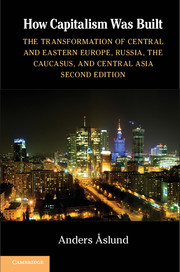Crossref Citations
This Book has been
cited by the following publications. This list is generated based on data provided by Crossref.
2015.
The Dirty Side of the Garment Industry.
p.
148.
Touchton, Michael
2015.
Who commits to the rule of law? Constrained government and foreign direct investment in postcommunist states.
East European Politics,
Vol. 31,
Issue. 4,
p.
468.
Smirnov, S.
2015.
Economic Growth and Economic crises in Russia: The End of the 1920s - 2014.
Voprosy Ekonomiki,
p.
28.
Nenovsky, Nikolay
and
Borisova, Gergana Mihaylova
2015.
Debts, ideas and interests in the Balkans.
Économie et Institutions,
Guardiancich, Igor
2016.
Slovenia: The End of a Success Story? When a Partial Reform Equilibrium Turns Bad.
Europe-Asia Studies,
Vol. 68,
Issue. 2,
p.
205.
Blien, Uwe
Möller, Joachim
Hong Van, Phan thi
and
Brunow, Stephan
2016.
Long-Lasting Labour Market Consequences of German Unification
.
Jahrbücher für Nationalökonomie und Statistik,
Vol. 236,
Issue. 2,
p.
181.
Bazhal, Iurii
2017.
The Political Economy of Innovation Development.
p.
65.
Bazhal, Iurii
2017.
The Political Economy of Innovation Development.
p.
15.
Panchyshyn, Stepan
and
Hrabynska, Iryna
2018.
ABOUT SPELLS AND RECIDIVISM OF THE TRANSITION ECONOMIES’ PARTICIPATION IN IMF PROGRAMS.
EUREKA: Social and Humanities,
Vol. 5,
Issue. ,
p.
36.
Gentile, Michael
2018.
Three Metals and the ‘Post‐Socialist City’: Reclaiming the Peripheries of Urban Knowledge.
International Journal of Urban and Regional Research,
Vol. 42,
Issue. 6,
p.
1140.
2019.
Timothy Frye, Property Rights and Property Wrongs: How Power, Institutions, and Norms Shape Economic Conflict in Russia.
Japanese Journal of Comparative Economics,
Vol. 56,
Issue. 1,
p.
1_74.
Ignatov, Augustin
2019.
Institutional Efficiency, Entrepreneurship, and the Premises of Economic Development in the Eastern European Countries.
Studia Universitatis Babes-Bolyai Oeconomica,
Vol. 64,
Issue. 2,
p.
12.
Ralston, David A.
Egri, Carolyn P.
Naoumova, Irina
Treviño, Len J.
Shimizu, Katsuhiko
and
Li, Yongjuan
2020.
An empirical test of the trichotomy of values crossvergence theory.
Asia Pacific Journal of Management,
Vol. 37,
Issue. 1,
p.
65.
Quoc Trung, Trinh
and
Van Tan, Nguyen
2020.
Tax incentive policy and firm performance: evidence from Vietnam.
Investment Management and Financial Innovations,
Vol. 17,
Issue. 2,
p.
277.
Beimenbetov, Serik
2020.
Die politischen Systeme Zentralasiens.
p.
359.
Pilipenko, Igor V.
2021.
The transition process and institutions: on the issue of the standard of living in the countries of Central and Eastern Europe — members of the European Union.
Baltic Region,
Vol. 13,
Issue. 1,
p.
153.
Niftiyev, Ibrahim
2021.
Performance Evaluation of the Fruit and Vegetable Subsectors in the Azerbaijani Economy: a Combinatorial Analysis Using Regression and Principal Component Analysis.
Zagreb International Review of Economics and Business,
Vol. 24,
Issue. s1,
p.
27.
Buggle, Johannes C.
and
Nafziger, Steven
2021.
The Slow Road from Serfdom: Labor Coercion and Long-Run Development in the Former Russian Empire.
The Review of Economics and Statistics,
Vol. 103,
Issue. 1,
p.
1.
Stojanović-Gajić, Sonja
and
Pavlović, Dušan
2021.
State capture, hybrid regimes, and security sector reform.
Journal of Regional Security,
Vol. 16,
Issue. 2,
p.
89.
Bazhal, Iurii
2022.
Business Development and Economic Governance in Southeastern Europe.
p.
195.





